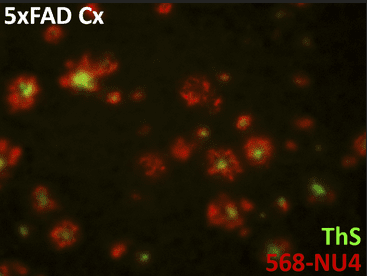New MRI Probe Technology For Early Detection Of Alzheimer’s Disease
A research team consisting of scientists and engineers from Northwestern University has developed a novel non-invasive diagnostic that can detect the Alzheimer’s disease in a living animal at an early stage of the disease. This approach will help to identify amyloid beta brain toxins responsible for onset of the disease at the initial stage before the symptoms of the disease come into sight. The primary objective of the research is both to determine the presence of Alzheimer’s disease early and to provide the drugs or therapies that will help to prevent the disease from causing any further damage to the neurons.

The new brain imaging method consists of an MRI (magnetic resonance imaging) probe that works in tandem with a magnetic nanostructure (MNS) and an antibody, which helps to detect amyloid beta oligomers brain toxins unlike conventional technology that detects plaques. Owing to the magnetic nanostructures, these amyloid beta oligomers gather together at different locations and appear as dark areas in MRI scans of the brain. According to Klein, a professor of neurobiology in the Weinberg College of Arts and Sciences, by using this brain imaging method, they were able to see the toxins attached to neurons of the brain resulting in its death which can eventually lead to memory loss.
While performing the MRI scan on live animal’s brain having Alzheimer’s disease, the researchers found the presence of the toxic in the hippocampus in MRI scans of the brain. The team also studied human brain tissues of the individuals, who died from Alzheimer’s and those who did not have the disease, from Northwestern’s Cognitive Neurology and Alzheimer’s Disease Center.
You can have the detailed look at the #-Link-Snipped-# that was published by the journal Nature Nanotechnology.
Source: #-Link-Snipped-#
The new brain imaging method consists of an MRI (magnetic resonance imaging) probe that works in tandem with a magnetic nanostructure (MNS) and an antibody, which helps to detect amyloid beta oligomers brain toxins unlike conventional technology that detects plaques. Owing to the magnetic nanostructures, these amyloid beta oligomers gather together at different locations and appear as dark areas in MRI scans of the brain. According to Klein, a professor of neurobiology in the Weinberg College of Arts and Sciences, by using this brain imaging method, they were able to see the toxins attached to neurons of the brain resulting in its death which can eventually lead to memory loss.
While performing the MRI scan on live animal’s brain having Alzheimer’s disease, the researchers found the presence of the toxic in the hippocampus in MRI scans of the brain. The team also studied human brain tissues of the individuals, who died from Alzheimer’s and those who did not have the disease, from Northwestern’s Cognitive Neurology and Alzheimer’s Disease Center.
You can have the detailed look at the #-Link-Snipped-# that was published by the journal Nature Nanotechnology.
Source: #-Link-Snipped-#
0
